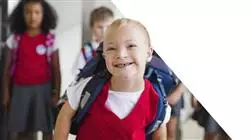University certificate
The world's largest faculty of psychology”
Description
Access to a renewed and updated didactic material on Social Inclusion and Inclusive Education, with practical cases and real examples that will help you contextualize each subject matter"

The need to create a more inclusive school environment is growing, as society itself is moving towards more diverse communities, where it is important to integrate cultures, ethnic groups and abilities of all kinds. The psychologist plays a fundamental role in this integration process, as they are responsible for advising students and addressing possible problems that may arise.
For this approach it is essential to have updated pedagogical and psychological methodologies and tools, based on the most rigorous practical evidence. TECH, for the development of this postgraduate certificate, has brought together a team of teachers from the fields of pedagogy, psychology and education. All the syllabus has been written by professionals with vast experience in the topics covered, which gives greater quality and contextualization to all the theory.
The psychologist has the freedom to adapt the course load to their own pace, without the pressure of on-site classes or pre-set schedules. On the contrary, in TECH it is the psychologist himself who sets thier own study time, with the optimum flexibility to combine it with the highest personal and professional respon sibilities and demands. All content is downloadable from any device with an internet connection, and can be studied from the comfort of a tablet, computer or smartphone of reference.
Delve into the integration of ICT in the inclusive school, with the multitude of applications and telematic resources that provide the psychologist in educational environments"
This postgraduate certificate in Social Inclusion and Inclusive Education contains the most complete and up-to-date program on the market. The most important features include:
- The development of case studies presented by experts in inclusive education for children and adolescents
- The graphic, schematic, and practical contents with which they are created, provide practical information on the disciplines that are essential for professional practice
- Practical exercises where self-assessment can be used to improve learning
- Its special emphasis on innovative methodologies
- Theoretical lessons, questions to the expert, debate forums on controversial topics, and individual reflection assignments
- Content that is accessible from any fixed or portable device with an Internet connection
Visualize practical cases and real examples of multilevel teaching, attention to diversity, social inclusion and more topics of great interest for the psychologist with orientation to educational environments"
The program’s teaching staff includes professionals from the field who contribute their work experience to this educational program, as well as renowned specialists from leading societies and prestigious universities.
The multimedia content, developed with the latest educational technology, will provide the professional with situated and contextual learning, i.e., a simulated environment that will provide immersive education programmed to learn in real situations.
This program is designed around Problem-Based Learning, whereby the professional must try to solve the different professional practice situations that arise during the academic year For this purpose, the students will be assisted by an innovative interactive video system created by renowned and experienced experts.
Download the entire syllabus and take advantage of it even after completing the program, gaining a high quality reference guide on issues of Social Inclusion and Inclusive Education"

Choose your own study time, without having to stick to a fixed schedule or attend classes in person. All multimedia content is already recorded and available to you in the virtual classroom"
Objectives
The casuistry that can occur in heterogeneous school environments is multiple and can present a challenge for the psychologist who must intervene. Therefore, the main objective of this program is to provide the psychology professional with the most effective methodological and pedagogical tools in Social Inclusion and Inclusive Education. To this end, the competencies for the identification of students' needs will be improved, as well as the planning and protocols for inclusion in school environments of all kinds.

You will surpass your most ambitious goals of updating and deepening your knowledge in Social Inclusion and Inclusive Eduaction, thanks to an exhaustive syllabus with a large amount of supplementary material"
General Objectives
- Enable the student to teach in situations of risk of exclusion
- Define the main characteristics of inclusive education
- Manage the techniques and strategies for the intervention with the diVersity of students, as well as with the educational community: families and environment
- Analyze the role of teachers and families in the context of inclusive education
- Interpret all the elements and aspects concerning teacher preparation in the inclusive school
- Develop in the student ability to develop their own methodology and work system
- Internalize the typology of students who are at risk and socially excluded, and how the educational system should respond to them
- Describe the functioning of the child and youth protection system
- Study the different types of protection measures and their treatment in the school environment
- Analyze situations of child abuse and the protocols for action by the psychology professional
- Identify the stages of development from birth to adolescence; achieving that students have their own judgment to establish the effects that cognitive, communicative, motor and emotional processes have on child development
- Detect risk factors of different nature that may alter development throughout the life cycle
- Describe the general circumstances of the mentored students and how these may affect their educational environment
- Learn how to respond to students under guardianship and their families from the school environment
- Apply mediation as a pedagogical tool for conflict resolution and harmonization of the educational community
Specific Objectives
- Understand the key concepts related to educational and social inclusion
- Know the traditional methods of education
- Know the fundamental methods of inclusive education
- Learn how to identify the needs of students
- Identify the needs and possibilities of the educational center
- Be able to plan an educational response adapted to the necessities

Know the most recent developments around Social Inclusion and Inclusive Education, with its application to the curriculum, digital resources and advanced principles"
Postgraduate Certificate in Inclusive Education and Social Inclusion.
Inclusive education is a pedagogical model that seeks to ensure that all students, regardless of their abilities or needs, have access to the same education and opportunities. Inclusive education is based on a human rights perspective, recognizing diversity as a value and a source of mutual enrichment. The goal is to develop an educational system in which individual differences are respected and social inclusion is fostered.
To develop inclusive education, it is necessary to implement a series of inclusive strategies and practices. Some of these practices may include adapting educational materials for different ability levels, vocational and career guidance, and including additional support where needed. Inclusive education also involves providing a safe and friendly educational environment for all students, without discrimination based on race, gender, sexual orientation, religion, or ability.
Social inclusion goes beyond inclusive education and refers to the process of incorporating those who, for whatever reason, have felt marginalized or excluded from society. Social inclusion seeks to create a more just and equitable society, where all people have equal opportunities and access to the same resources, services and benefits.
To develop social inclusion, public and social policies must be implemented that address the structural and systemic challenges that often contribute to social exclusion. This may include investing in mental health services and community support, promoting equal opportunity in employment and access to training and educational opportunities, and promoting diversity and tolerance in society.
Inclusive education and social inclusion are closely related, and both are fundamental to promoting a just, equitable and tolerant society. By implementing inclusive policies and practices, respect and acceptance of diversity can be fostered, creating a more open and inclusive society for all.







